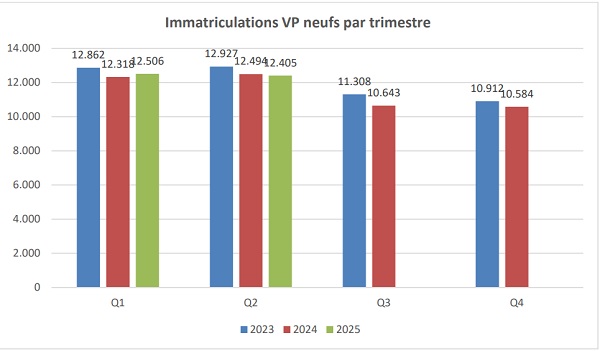 Credit: House of Automobile
Credit: House of Automobile
On Wednesday 2 July 2025, the House of Automobile released an analysis of new passenger car registrations in Luxembourg for the first half of 2025.
The new passenger car registration market showed mixed trends in the first half of the year, marking a turning point in purchasing dynamics. Overall registrations remained relatively stable compared to 2024 but were down 3.4% from the same period in 2023.
However, the House of Automobile noted that this overall trend masks significant structural changes between customer segments. Registrations by private customers increased by 5.7% in the first half compared to 2024 and by 21.5% compared to 2023 - an increase of 2,266 vehicles. This trend is said to reflect growing household confidence and an adjustment to a less favourable tax environment for company fleets.
In contrast, company car registrations decreased by 4.7% compared to the first half of 2024 and by 20.6% compared to the same period in 2023, representing a net loss of 3,144 vehicles over two years. This decline was mainly driven by operational leasing, which fell 21.8% compared to the first half of 2024 - a decrease of 1,989 vehicles. This reversal is considered all the more striking given the segment's consistent double-digit growth over the past decade.
The House of Automobile attributed the slowdown largely to a new "unfavourable" tax regime introduced at the start of 2025, targeting company vehicles with non-100% electric engines. The significant increase in the tax rate for benefits in kind has reportedly discouraged many employees from choosing company cars. Rather than switching to electric vehicles (EVs), as hoped by authorities, some users have opted to forgo the benefit of a company car altogether.
While EV registrations were still rising compared to the first quarter of 2024, they fell 7.2% during the second half of the year.
The House of Automobile pointed to ongoing legal uncertainty over VAT rules, arguing that authorities had yet to clarify the taxable base for company cars. It said this uncertainty creates insecurity for both employers and employees, further hindering the use of company fleets and Luxembourg's broader economic growth.









